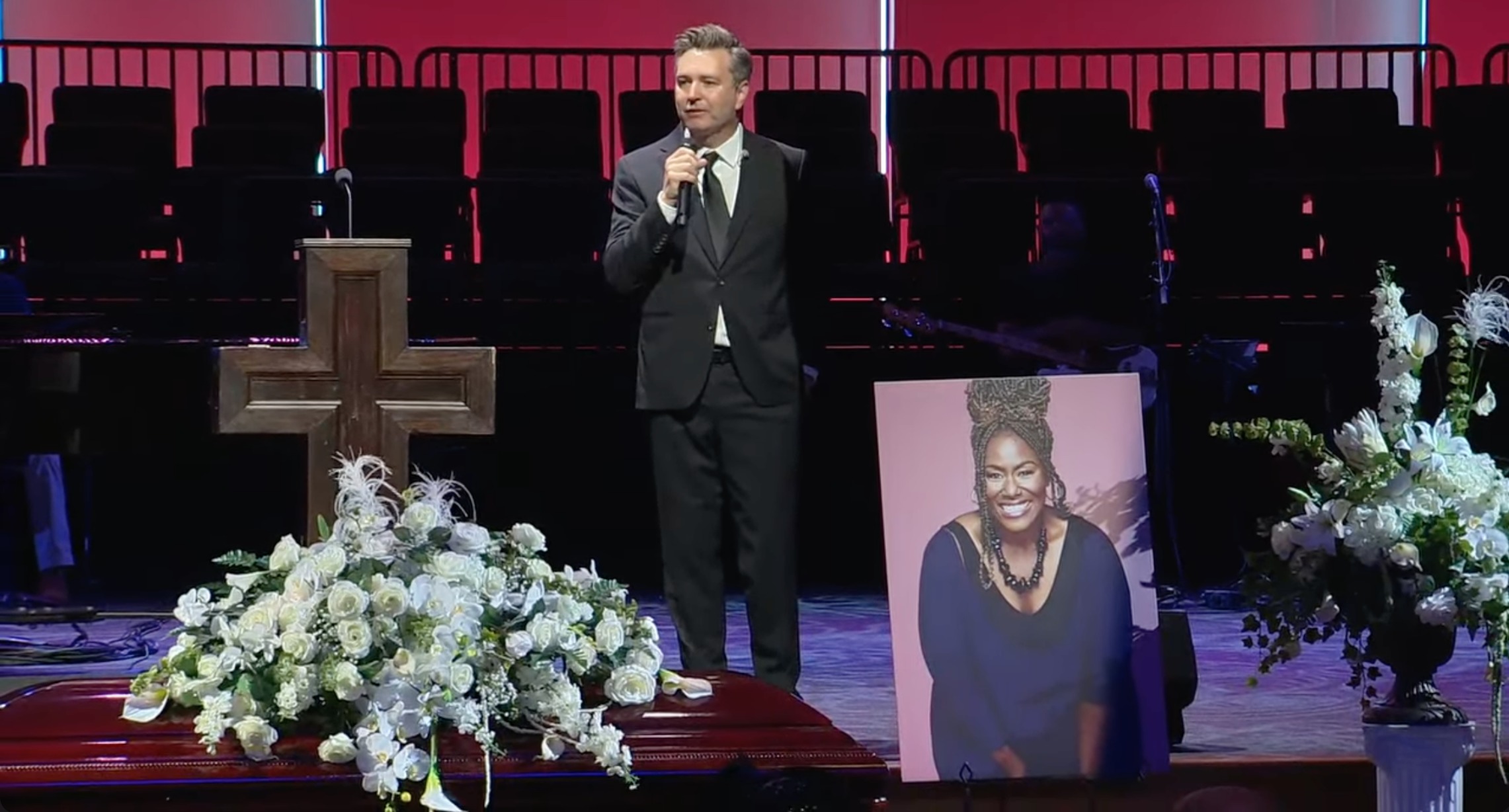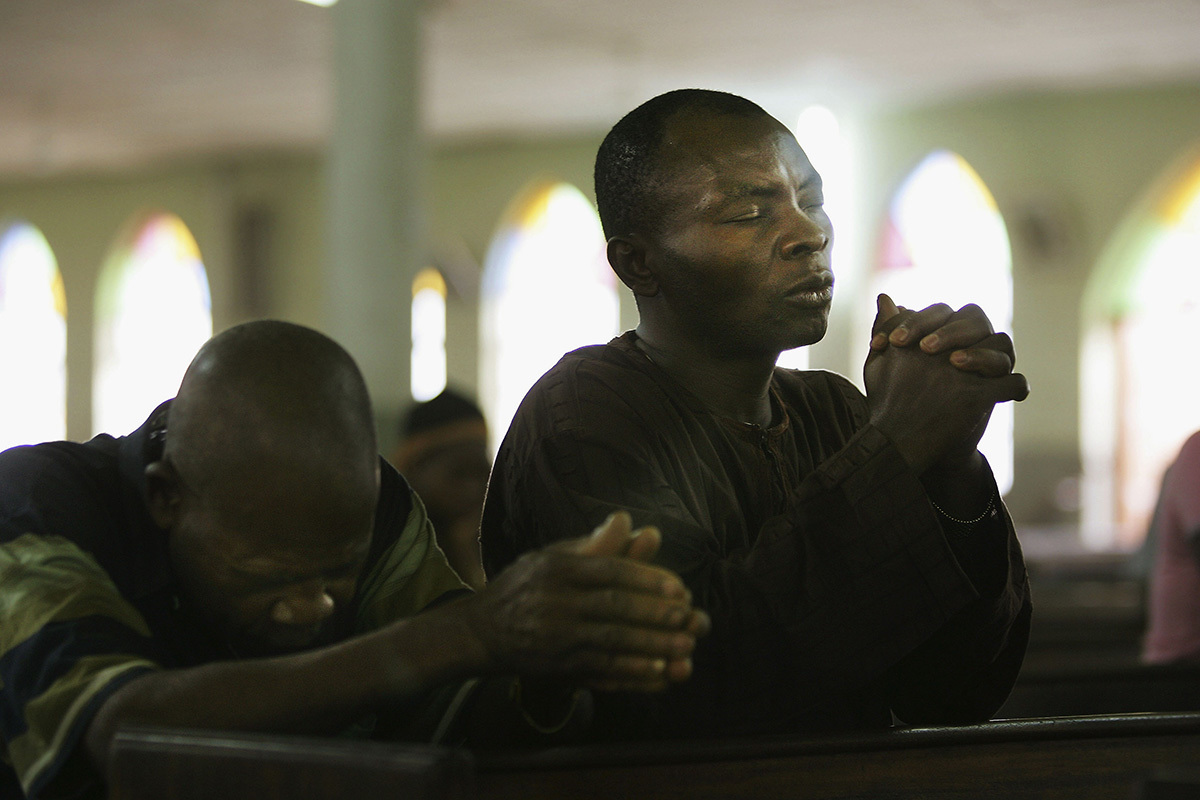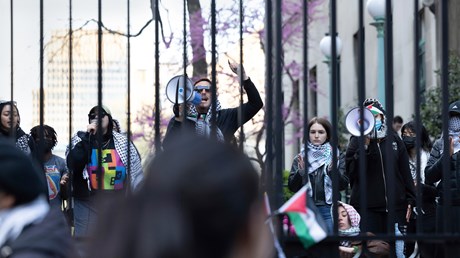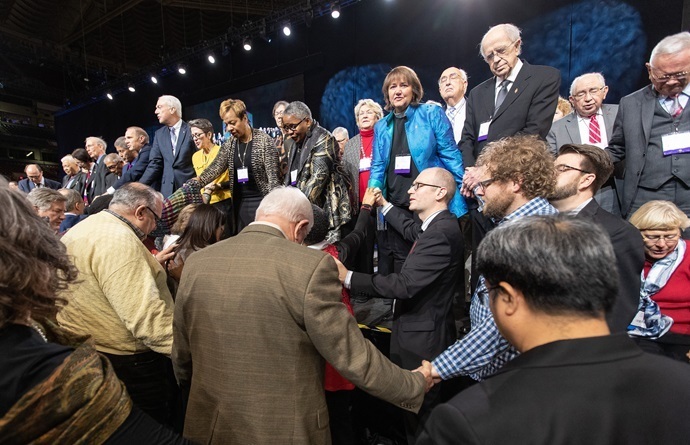Searched: Unity
News
 A man who was jailed for setting fire to the historic Colonial Manor United Methodist Church in West Deptford, New Jersey, says he was only trying to scare bugs, but local prosecutors say he has been a longtime danger to his community. A man who was jailed for setting fire to the historic Colonial Manor United Methodist Church in West Deptford, New Jersey, says he was only trying to scare bugs, but local prosecutors say he has been a longtime danger to his community. |
 UCLA undergrad Eli Tsives says students who support Palestinians call for intifadas tied to genocide, but urges the Jewish community not to be intimidated; Elinor was assaulted by protesters UCLA undergrad Eli Tsives says students who support Palestinians call for intifadas tied to genocide, but urges the Jewish community not to be intimidated; Elinor was assaulted by protesters |
Migrant rights have been off-radar for many Panamanian Christians. But as pressures increase, some are speaking out ahead of this weekend's general elections.
 On May 5, Panamanians will vote for a new president. The outcome of this election may have consequences for far more than its 4.4 million residents; it could change the migration reality for the hundreds of thousands of people traveling from South America, Asia, and Africa who pass through the Central American country en route to the United States.Leading in the polls is José Raúl Mulino, a candidate for Realizando Metas (Realizing Goals), a right-wing populist party founded by disgraced president Ricardo Martinelli. He has vowed to shut down the Darién Gap, a densely forested jungle area that migrants must traverse to enter Panama from the bordering country of Colombia.“We’re going to close Darién and we’re going to repatriate every one of these people, respecting their human rights,” said Raúl Mulino in April.For many Panamanians, there was no migrant crisis before 2022. After passing through the Darién gap, migrants passed through the country on government buses to the Costa Rican border. But after a shift in US migrant policy sent many back to Central America a couple years ago, hundreds have since moved to Panama City and a handful of small towns. Residents have begun to blame them for crime and for overwhelming their sanitation systems.Though evangelicals have largely been on the sidelines, many leaders say they should have done more.“The church does not see the refugee problem as their own problem,” said Panamanian missionary Robert Bruneau, a regional leader with United World Mission. “They believe it is something the state should do and are not aware of the great opportunity they have to graciously and honorably serve someone who ...Continue reading... On May 5, Panamanians will vote for a new president. The outcome of this election may have consequences for far more than its 4.4 million residents; it could change the migration reality for the hundreds of thousands of people traveling from South America, Asia, and Africa who pass through the Central American country en route to the United States.Leading in the polls is José Raúl Mulino, a candidate for Realizando Metas (Realizing Goals), a right-wing populist party founded by disgraced president Ricardo Martinelli. He has vowed to shut down the Darién Gap, a densely forested jungle area that migrants must traverse to enter Panama from the bordering country of Colombia.“We’re going to close Darién and we’re going to repatriate every one of these people, respecting their human rights,” said Raúl Mulino in April.For many Panamanians, there was no migrant crisis before 2022. After passing through the Darién gap, migrants passed through the country on government buses to the Costa Rican border. But after a shift in US migrant policy sent many back to Central America a couple years ago, hundreds have since moved to Panama City and a handful of small towns. Residents have begun to blame them for crime and for overwhelming their sanitation systems.Though evangelicals have largely been on the sidelines, many leaders say they should have done more.“The church does not see the refugee problem as their own problem,” said Panamanian missionary Robert Bruneau, a regional leader with United World Mission. “They believe it is something the state should do and are not aware of the great opportunity they have to graciously and honorably serve someone who ...Continue reading... |
A professor explains why examining a school's doctrinal statement isn't enough.
 When I speak at churches around the country, the conversation after my talks often turns to the state of Christian higher education. I’m a professor at a Christian institution, and Christian parents and grandparents want to know where high school graduates can go to have their faith deepened rather than undermined. These concerns have only become more pressing given the ongoing rise in young people wandering away from the church and describing their religious convictions as “nothing in particular.”The question many Christians have for me is which colleges are “safe” or “real” Christian schools, which usually means those that have a truly conservative theological ethos. For those who aren’t familiar with the world of Christian higher ed, it can be difficult to identify these schools from outside the campus community, and parents often (reasonably) conclude an institution’s stance on human sexuality is the simplest indicator of a college’s commitment to Christian orthodoxy.LGBTQ questions are indeed important, and they can serve as a proxy for an institution’s broader theology. But by itself, this isn’t a reliable formula for finding a good Christian college. A school may stake out a bold position on sexuality and yet capitulate to what I’d suggest is the most overlooked and therefore most insidious threat to Christian education in America right now.It’s not progressive theology. It’s a pervasive consumerist anthropology.Theological anthropology concerns our assumptions about the nature and purpose of humanity. And by “consumerist anthropology” I mean the belief—often subconsciously held—that ...Continue reading... When I speak at churches around the country, the conversation after my talks often turns to the state of Christian higher education. I’m a professor at a Christian institution, and Christian parents and grandparents want to know where high school graduates can go to have their faith deepened rather than undermined. These concerns have only become more pressing given the ongoing rise in young people wandering away from the church and describing their religious convictions as “nothing in particular.”The question many Christians have for me is which colleges are “safe” or “real” Christian schools, which usually means those that have a truly conservative theological ethos. For those who aren’t familiar with the world of Christian higher ed, it can be difficult to identify these schools from outside the campus community, and parents often (reasonably) conclude an institution’s stance on human sexuality is the simplest indicator of a college’s commitment to Christian orthodoxy.LGBTQ questions are indeed important, and they can serve as a proxy for an institution’s broader theology. But by itself, this isn’t a reliable formula for finding a good Christian college. A school may stake out a bold position on sexuality and yet capitulate to what I’d suggest is the most overlooked and therefore most insidious threat to Christian education in America right now.It’s not progressive theology. It’s a pervasive consumerist anthropology.Theological anthropology concerns our assumptions about the nature and purpose of humanity. And by “consumerist anthropology” I mean the belief—often subconsciously held—that ...Continue reading... |
The surprising argument that Saul of Tarsus was born into bondage.
 Of the many letters the apostle Paul wrote, few survived. We have a good deal of his communication to churches as a whole—letters to groups of believers in particular cities. This makes sense. Such letters were read publicly and often; they were copied and disseminated and celebrated as Scripture soon after the ink had dried.Paul sent a number of letters to individuals as well. To read his biblical writings is to sense that you are glimpsing only a fraction of his relational network and influence. Almost all of those letters have been lost.But there are exceptions.It was a tall order for personal letters to ascend to the level of canon. It helped to be bound up with a great figure, a leader of a great community. Timothy, for instance, was a towering second-generation church leader; he was also the bishop of Ephesus, a major city of the Roman Empire and a major Christian center. Titus was a pillar of the Gentile mission and served as the bishop of Crete. Their eponymous letters had huge communities to champion their inclusion in Scripture.A mystery for the ages, then, is why Paul’s letter to Philemon—the leader of a house church in the minor city of Colossae—survives at all. It’s the most personal letter we have from Paul. It runs only 25 verses.The letter reveals a story. In it, a man named Onesimus has fled his master Philemon. Onesimus was most likely a household slave, a bondservant high in the pecking order.To call him a runaway slave is true, though it is misleading for modern readers, who might imagine Onesimus attempting to escape through something like the Underground Railroad.In fact, some scholars argue that Onesimus sought out Paul but planned to return to his master. Steven M. Baugh, ...Continue reading... Of the many letters the apostle Paul wrote, few survived. We have a good deal of his communication to churches as a whole—letters to groups of believers in particular cities. This makes sense. Such letters were read publicly and often; they were copied and disseminated and celebrated as Scripture soon after the ink had dried.Paul sent a number of letters to individuals as well. To read his biblical writings is to sense that you are glimpsing only a fraction of his relational network and influence. Almost all of those letters have been lost.But there are exceptions.It was a tall order for personal letters to ascend to the level of canon. It helped to be bound up with a great figure, a leader of a great community. Timothy, for instance, was a towering second-generation church leader; he was also the bishop of Ephesus, a major city of the Roman Empire and a major Christian center. Titus was a pillar of the Gentile mission and served as the bishop of Crete. Their eponymous letters had huge communities to champion their inclusion in Scripture.A mystery for the ages, then, is why Paul’s letter to Philemon—the leader of a house church in the minor city of Colossae—survives at all. It’s the most personal letter we have from Paul. It runs only 25 verses.The letter reveals a story. In it, a man named Onesimus has fled his master Philemon. Onesimus was most likely a household slave, a bondservant high in the pecking order.To call him a runaway slave is true, though it is misleading for modern readers, who might imagine Onesimus attempting to escape through something like the Underground Railroad.In fact, some scholars argue that Onesimus sought out Paul but planned to return to his master. Steven M. Baugh, ...Continue reading... |
As the presidential election approaches, the incumbent government seeks to win support with aid to churches and pastors.
 In many countries, politicians try to win over religious voters by highlighting areas of shared interest between their agenda and the faithful’s priorities. In Venezuela, candidates are offering pastors cash.With less than three months until Venezuela’s presidential elections, incumbent Nicolás Maduro is expanding two initiatives specifically aimed at the evangelical community, which represents 30.9 percent of the country’s population.Bono El Buen Pastor (“The Good Shepherd Bonus”), created last year, and Plan Mi Iglesia Bien Equipada (“My Well-Equipped Church Plan”) offer resources to pastors and their churches, including cash, chairs, construction materials, and expensive sound equipment—no strings attached. Mi Iglesia Bien Equipada exists under Misión Venezuela Bella, a government program that invests in recreation and arts spaces, which has remodeled nearly 3,000 churches since 2019.At the beginning of March, Maduro gathered 17,000 people in a pastors-only event in the northern city of Carabobo and announced that 20,000 additional pastors had become beneficiaries of the Bono El Buen Pastor program, which would deliver a monthly stipend of 495 bolivars (around $14 USD) to each new member. (Venezuela’s minimum legal monthly wage is 130 bolivars or $3.50.)Officially, the government says the program aims to give churchgoers dignified spaces where they can develop their faith. There are, however, those who view the state’s generosity with some suspicion.César Mermejo, president of the Evangelical Council of Venezuela and a leader of the Federación de Iglesias Mizpa de Venezuela, called these efforts by Maduro an attempt to buy the souls ...Continue reading... In many countries, politicians try to win over religious voters by highlighting areas of shared interest between their agenda and the faithful’s priorities. In Venezuela, candidates are offering pastors cash.With less than three months until Venezuela’s presidential elections, incumbent Nicolás Maduro is expanding two initiatives specifically aimed at the evangelical community, which represents 30.9 percent of the country’s population.Bono El Buen Pastor (“The Good Shepherd Bonus”), created last year, and Plan Mi Iglesia Bien Equipada (“My Well-Equipped Church Plan”) offer resources to pastors and their churches, including cash, chairs, construction materials, and expensive sound equipment—no strings attached. Mi Iglesia Bien Equipada exists under Misión Venezuela Bella, a government program that invests in recreation and arts spaces, which has remodeled nearly 3,000 churches since 2019.At the beginning of March, Maduro gathered 17,000 people in a pastors-only event in the northern city of Carabobo and announced that 20,000 additional pastors had become beneficiaries of the Bono El Buen Pastor program, which would deliver a monthly stipend of 495 bolivars (around $14 USD) to each new member. (Venezuela’s minimum legal monthly wage is 130 bolivars or $3.50.)Officially, the government says the program aims to give churchgoers dignified spaces where they can develop their faith. There are, however, those who view the state’s generosity with some suspicion.César Mermejo, president of the Evangelical Council of Venezuela and a leader of the Federación de Iglesias Mizpa de Venezuela, called these efforts by Maduro an attempt to buy the souls ...Continue reading... |
This Thursday, May 2, 2024, marks the 73rd ? time that our nation has honored the National Day of Prayer.
|
 A community in Nashville, Tennessee, gathered to bid farewell to Mandisa, the Christian singer and former “American Idol” contestant who died at 47. The funeral service was held at Brentwood Baptist on Saturday morning, where her family, church members and mourners came together to remember the life of a singer whose voice and spirit touched many. A community in Nashville, Tennessee, gathered to bid farewell to Mandisa, the Christian singer and former “American Idol” contestant who died at 47. The funeral service was held at Brentwood Baptist on Saturday morning, where her family, church members and mourners came together to remember the life of a singer whose voice and spirit touched many. |
As the presidential election approaches, the incumbent government seeks to win support with aid to churches and pastors.
 In many countries, politicians try to win over religious voters by highlighting areas of shared interest between their agenda and the faithful’s priorities. In Venezuela, candidates are offering pastors cash.With less than three months until Venezuela’s presidential elections, incumbent Nicolás Maduro is expanding two initiatives specifically aimed at the evangelical community, which represents 30.9 percent of the country’s population.Bono El Buen Pastor (“The Good Shepherd Bonus”), created last year, and Plan Mi Iglesia Bien Equipada (“My Well-Equipped Church Plan”) offer resources to pastors and their churches, including cash, chairs, construction materials, and expensive sound equipment—no strings attached. Mi Iglesia Bien Equipada exists under Misión Venezuela Bella, a government program that invests in recreation and arts spaces, which has remodeled nearly 3,000 churches since 2019.At the beginning of March, Maduro gathered 17,000 people in a pastors-only event in the northern city of Carabobo and announced that 20,000 additional pastors had become beneficiaries of the Bono El Buen Pastor program, which would deliver a monthly stipend of 495 bolivars (around $14 USD) to each new member. (Venezuela’s minimum legal monthly wage is 130 bolivars or $3.50.)Officially, the government says the program aims to give churchgoers dignified spaces where they can develop their faith. There are, however, those who view the state’s generosity with some suspicion.César Mermejo, president of the Evangelical Council of Venezuela and a leader of the Federación de Iglesias Mizpa de Venezuela, called these efforts by Maduro an attempt to buy the souls ...Continue reading... In many countries, politicians try to win over religious voters by highlighting areas of shared interest between their agenda and the faithful’s priorities. In Venezuela, candidates are offering pastors cash.With less than three months until Venezuela’s presidential elections, incumbent Nicolás Maduro is expanding two initiatives specifically aimed at the evangelical community, which represents 30.9 percent of the country’s population.Bono El Buen Pastor (“The Good Shepherd Bonus”), created last year, and Plan Mi Iglesia Bien Equipada (“My Well-Equipped Church Plan”) offer resources to pastors and their churches, including cash, chairs, construction materials, and expensive sound equipment—no strings attached. Mi Iglesia Bien Equipada exists under Misión Venezuela Bella, a government program that invests in recreation and arts spaces, which has remodeled nearly 3,000 churches since 2019.At the beginning of March, Maduro gathered 17,000 people in a pastors-only event in the northern city of Carabobo and announced that 20,000 additional pastors had become beneficiaries of the Bono El Buen Pastor program, which would deliver a monthly stipend of 495 bolivars (around $14 USD) to each new member. (Venezuela’s minimum legal monthly wage is 130 bolivars or $3.50.)Officially, the government says the program aims to give churchgoers dignified spaces where they can develop their faith. There are, however, those who view the state’s generosity with some suspicion.César Mermejo, president of the Evangelical Council of Venezuela and a leader of the Federación de Iglesias Mizpa de Venezuela, called these efforts by Maduro an attempt to buy the souls ...Continue reading... |
As the presidential election approaches, the incumbent government seeks to win support with aid to churches and pastors.
 In many countries, politicians try to win over religious voters by highlighting areas of shared interest between their agenda and the faithful’s priorities. In Venezuela, candidates are offering pastors cash.With less than three months until Venezuela’s presidential elections, incumbent Nicolás Maduro is expanding two initiatives specifically aimed at the evangelical community, which represents 30.9 percent of the country’s population.Bono El Buen Pastor (“The Good Shepherd Bonus”), created last year, and Plan Mi Iglesia Bien Equipada (“My Well-Equipped Church Plan”) offer resources to pastors and their churches, including cash, chairs, construction materials, and expensive sound equipment—no strings attached. Mi Iglesia Bien Equipada exists under Misión Venezuela Bella, a government program that invests in recreation and arts spaces, which has remodeled nearly 3,000 churches since 2019.At the beginning of March, Maduro gathered 17,000 people in a pastors-only event in the northern city of Carabobo and announced that 20,000 additional pastors had become beneficiaries of the Bono El Buen Pastor program, which would deliver a monthly stipend of 495 bolivars (around $14 USD) to each new member. (Venezuela’s minimum legal monthly wage is 130 bolivars or $3.50.)Officially, the government says the program aims to give churchgoers dignified spaces where they can develop their faith. There are, however, those who view the state’s generosity with some suspicion.César Mermejo, president of the Evangelical Council of Venezuela and a leader of the Federación de Iglesias Mizpa de Venezuela, called these efforts by Maduro an attempt to buy the souls ...Continue reading... In many countries, politicians try to win over religious voters by highlighting areas of shared interest between their agenda and the faithful’s priorities. In Venezuela, candidates are offering pastors cash.With less than three months until Venezuela’s presidential elections, incumbent Nicolás Maduro is expanding two initiatives specifically aimed at the evangelical community, which represents 30.9 percent of the country’s population.Bono El Buen Pastor (“The Good Shepherd Bonus”), created last year, and Plan Mi Iglesia Bien Equipada (“My Well-Equipped Church Plan”) offer resources to pastors and their churches, including cash, chairs, construction materials, and expensive sound equipment—no strings attached. Mi Iglesia Bien Equipada exists under Misión Venezuela Bella, a government program that invests in recreation and arts spaces, which has remodeled nearly 3,000 churches since 2019.At the beginning of March, Maduro gathered 17,000 people in a pastors-only event in the northern city of Carabobo and announced that 20,000 additional pastors had become beneficiaries of the Bono El Buen Pastor program, which would deliver a monthly stipend of 495 bolivars (around $14 USD) to each new member. (Venezuela’s minimum legal monthly wage is 130 bolivars or $3.50.)Officially, the government says the program aims to give churchgoers dignified spaces where they can develop their faith. There are, however, those who view the state’s generosity with some suspicion.César Mermejo, president of the Evangelical Council of Venezuela and a leader of the Federación de Iglesias Mizpa de Venezuela, called these efforts by Maduro an attempt to buy the souls ...Continue reading... |
But true liberty, in art and in life, is created by constraints.
 Taylor Swift answers to no one.Not music industry executives: Her songs returned to TikTok in the middle of a licensing dispute between the app and her label.Not mayors: When she graced their cities during her Eras tour, they declared days in her honor.Not the international community: A Singapore-exclusive stop in Southeast Asia sparked a row between the city-state and nearby Thailand and the Philippines. The Japanese embassy issued a statement about her Super Bowl travel plans.And Swift doesn’t plan on stopping anytime soon. She announced new music within minutes of winning her latest Grammy for album of the year.You might take all this as proof of Swift’s business genius, nothing personal. But in her latest album, The Tortured Poets Department, there’s definitely an “above it all” attitude. These songs are snarly. America’s sweetheart may have nothing left to prove. But she certainly has scores left to settle.Swift is hardly a stranger to revenge. This is the songwriter, after all, who brought us lyrics like “It’s obvious that wanting me dead / Has really brought you two together.”But TTPD broadens her aggression and scorns the prospect of reconciliation. A small-town girl takes on her community over a controversial love affair and trolls her parents with a joke pregnancy announcement. A depressed performer boasts sardonically about how well she can sell happiness to frenzied fans. A woman seethes at being seen as a problematic starlet by her new boyfriend’s circle.There’s a track suspiciously similar to an Olivia Rodrigo song (the two singers have a rumored feud). The title of another appears to name-drop Kim Kardashian, an older nemesis.Critics agree that ...Continue reading... Taylor Swift answers to no one.Not music industry executives: Her songs returned to TikTok in the middle of a licensing dispute between the app and her label.Not mayors: When she graced their cities during her Eras tour, they declared days in her honor.Not the international community: A Singapore-exclusive stop in Southeast Asia sparked a row between the city-state and nearby Thailand and the Philippines. The Japanese embassy issued a statement about her Super Bowl travel plans.And Swift doesn’t plan on stopping anytime soon. She announced new music within minutes of winning her latest Grammy for album of the year.You might take all this as proof of Swift’s business genius, nothing personal. But in her latest album, The Tortured Poets Department, there’s definitely an “above it all” attitude. These songs are snarly. America’s sweetheart may have nothing left to prove. But she certainly has scores left to settle.Swift is hardly a stranger to revenge. This is the songwriter, after all, who brought us lyrics like “It’s obvious that wanting me dead / Has really brought you two together.”But TTPD broadens her aggression and scorns the prospect of reconciliation. A small-town girl takes on her community over a controversial love affair and trolls her parents with a joke pregnancy announcement. A depressed performer boasts sardonically about how well she can sell happiness to frenzied fans. A woman seethes at being seen as a problematic starlet by her new boyfriend’s circle.There’s a track suspiciously similar to an Olivia Rodrigo song (the two singers have a rumored feud). The title of another appears to name-drop Kim Kardashian, an older nemesis.Critics agree that ...Continue reading... |
Do the citizens of a community have a right to take action to oppose the establishment of businesses that will negatively affect their way of life – especially if it's a foreign source? And why are elected representatives ignoring the very people who put them...
|
Arkansas Attorney General Tim Griffin issued the following statement after co-leading, alongside Tennessee Attorney General Jonathan Skrmetti, a coalition of 17 states in suing the Equal Employment Opportunity Commission (EEOC) over its new rule mandating workplace abortion accommodations through an erroneous interpretation of the Pregnant Workers Fairness Act of 2022 (PWFA): “This is yet another […]The post 17 States Challenge Biden Rule Forcing Employers to Facilitate Abortions appeared first on LifeNews.com.
|
 Post-Passover, rocket attacks near Gaza and Lebanon raise questions on border community safety. Evacuations prompt reevaluation of defensive strategies and military presence. Post-Passover, rocket attacks near Gaza and Lebanon raise questions on border community safety. Evacuations prompt reevaluation of defensive strategies and military presence. |
 A Nigerian local government official said that a Christian in Otukpo County's Entepka village was killed by herdsmen last Saturday, after they killed two others two days earlier on April 18 in the Entepka District's Adoka-Icho community. A Nigerian local government official said that a Christian in Otukpo County's Entepka village was killed by herdsmen last Saturday, after they killed two others two days earlier on April 18 in the Entepka District's Adoka-Icho community. |
The government plans to close its porous border with Myanmar to boost security, separating ethnic groups that straddle the boundary.
 Ngamreichan Tuithung runs a Christian boarding school that sits right at the border of India’s Manipur state and Myanmar. Amazing Grace Mission School is based in Wanglee Market, a small Indian town, and serves around 150 students from Myanmar and 6 from India.Since Myanmar’s 2021 coup, the school has become a safe haven for parents wanting to send their children away from the violence of the war raging on in Myanmar. To Tuithung, it’s an opportunity to share with students and parents “about God’s love and how God is taking care of us.”For decades, some parents in Myanmar (also known as Burma) have been able to easily send their kids to school in India, thanks to a government policy that allows citizens of either country living within 10 miles of the border to freely enter the other country without a visa. Many tribal communities share ethnic ties, familial bonds, and a way of life transcending territorial boundaries. Tuithung, who is from the Naga ethnic group, grew up in India but has many relatives in Myanmar. Because of their close ties, he can speak Burmese and visits them often.However, all this will change as the Indian government proceeds with its decision to close the international border between India and Myanmar, which shares boundaries with four Indian states: Arunachal Pradesh, Nagaland, Manipur, and Mizoram. India’s home minister Amit Shah says the action is needed to “ensure the internal security” and “to maintain the demographic structure” of northeastern India as the war in Myanmar continues. Plans include constructing a fence and implementing a surveillance system.Tuithung believes that even with tightened borders, the government will provide ...Continue reading... Ngamreichan Tuithung runs a Christian boarding school that sits right at the border of India’s Manipur state and Myanmar. Amazing Grace Mission School is based in Wanglee Market, a small Indian town, and serves around 150 students from Myanmar and 6 from India.Since Myanmar’s 2021 coup, the school has become a safe haven for parents wanting to send their children away from the violence of the war raging on in Myanmar. To Tuithung, it’s an opportunity to share with students and parents “about God’s love and how God is taking care of us.”For decades, some parents in Myanmar (also known as Burma) have been able to easily send their kids to school in India, thanks to a government policy that allows citizens of either country living within 10 miles of the border to freely enter the other country without a visa. Many tribal communities share ethnic ties, familial bonds, and a way of life transcending territorial boundaries. Tuithung, who is from the Naga ethnic group, grew up in India but has many relatives in Myanmar. Because of their close ties, he can speak Burmese and visits them often.However, all this will change as the Indian government proceeds with its decision to close the international border between India and Myanmar, which shares boundaries with four Indian states: Arunachal Pradesh, Nagaland, Manipur, and Mizoram. India’s home minister Amit Shah says the action is needed to “ensure the internal security” and “to maintain the demographic structure” of northeastern India as the war in Myanmar continues. Plans include constructing a fence and implementing a surveillance system.Tuithung believes that even with tightened borders, the government will provide ...Continue reading... |
The rage of the mob is a poor substitute for real community.
 This piece was adapted from Russell Moore’s newsletter. Subscribe here.As Columbia University and other elite campuses erupt into protests against the United States’ diplomatic and military support of Israel’s war against Hamas, US Sen. John Fetterman denounced the antisemitic speech of some of these protesters, remarking on the social platform X, “Add some tiki torches and it’s Charlottesville for these Jewish students.”Whatever one thinks of Fetterman’s analogy or of the Israel-Hamas war, we would do well to listen to the common ring of the Charlottesville chant, “You will not replace us! Jews will not replace us!” with the one recorded this week on the Columbia campus: “We have Zionists who have entered the camp!”An observer might have asked in Charlottesville, “What Jews are trying to replace you?” The white nationalists there would no doubt have told such a person that a shadowy cabal was seeking to import immigrants, to commit “white genocide.” Just so, another observer might ask at Columbia, “What Zionists have entered your camp?” Israeli military forces? No. The “Zionists” in question are Jewish students—one wearing a Star of David—attempting to walk on campus.At one level, the video of the students chanting seems almost farcical, like a parody out of an old episode of Portlandia. The leader yells out a sentence; the followers repeat it back—even to the point of repeating back, in unison, “Repeat after me.” Does that part really have to be repeated? Well, kind of; that’s part of what happens in a chant. The message is not reasoned discourse. The rote nature of the repetition ...Continue reading... This piece was adapted from Russell Moore’s newsletter. Subscribe here.As Columbia University and other elite campuses erupt into protests against the United States’ diplomatic and military support of Israel’s war against Hamas, US Sen. John Fetterman denounced the antisemitic speech of some of these protesters, remarking on the social platform X, “Add some tiki torches and it’s Charlottesville for these Jewish students.”Whatever one thinks of Fetterman’s analogy or of the Israel-Hamas war, we would do well to listen to the common ring of the Charlottesville chant, “You will not replace us! Jews will not replace us!” with the one recorded this week on the Columbia campus: “We have Zionists who have entered the camp!”An observer might have asked in Charlottesville, “What Jews are trying to replace you?” The white nationalists there would no doubt have told such a person that a shadowy cabal was seeking to import immigrants, to commit “white genocide.” Just so, another observer might ask at Columbia, “What Zionists have entered your camp?” Israeli military forces? No. The “Zionists” in question are Jewish students—one wearing a Star of David—attempting to walk on campus.At one level, the video of the students chanting seems almost farcical, like a parody out of an old episode of Portlandia. The leader yells out a sentence; the followers repeat it back—even to the point of repeating back, in unison, “Repeat after me.” Does that part really have to be repeated? Well, kind of; that’s part of what happens in a chant. The message is not reasoned discourse. The rote nature of the repetition ...Continue reading... |
The world is realizing anew that our faith has tangible benefits. This is an opportunity for the gospel.
 As Christianity continues to decline in the West, the broader world has begun to notice something’s missing. There seems to be a growing awareness that—for all the scandals and failings of the church—the loss of a Christian culture leaves us all worse off, and that there are benefits to being a Christian and to living in a Christian society.For example, Derek Thompson recently wrote in The Atlantic about the loss of community that comes with declining church attendance. “Maybe religion, for all of its faults, works a bit like a retaining wall,” he concluded, “hold[ing] back the destabilizing pressure of American hyper-individualism, which threatens to swell and spill over in its absence.”Likewise, Harvard scholar Tyler J. VanderWeele has extensively researched the benefits of participation in religious services, finding that it leads to improved mental and physical health, happiness, and sense of meaning. Statistically, going to church regularly will help you flourish as a human being. As Brad Wilcox, a professor at the University of Virginia, has shown, regular church attendance even correlates with a more satisfying sex life!And then you have those like former atheist Ayaan Hirsi Ali who explain their conversion to Christianity at least partly as a response to the decay of the contemporary world, a world threatened by “woke ideology,” “global Islam,” and authoritarianism. “The only credible answer, I believe, lies in our desire to uphold the legacy of the Judeo-Christian tradition,” Hirsi Ali said in an essay announcing her new faith. Famous atheist Richard Dawkins objected to Hirsi Ali’s conversion yet seems to ...Continue reading... As Christianity continues to decline in the West, the broader world has begun to notice something’s missing. There seems to be a growing awareness that—for all the scandals and failings of the church—the loss of a Christian culture leaves us all worse off, and that there are benefits to being a Christian and to living in a Christian society.For example, Derek Thompson recently wrote in The Atlantic about the loss of community that comes with declining church attendance. “Maybe religion, for all of its faults, works a bit like a retaining wall,” he concluded, “hold[ing] back the destabilizing pressure of American hyper-individualism, which threatens to swell and spill over in its absence.”Likewise, Harvard scholar Tyler J. VanderWeele has extensively researched the benefits of participation in religious services, finding that it leads to improved mental and physical health, happiness, and sense of meaning. Statistically, going to church regularly will help you flourish as a human being. As Brad Wilcox, a professor at the University of Virginia, has shown, regular church attendance even correlates with a more satisfying sex life!And then you have those like former atheist Ayaan Hirsi Ali who explain their conversion to Christianity at least partly as a response to the decay of the contemporary world, a world threatened by “woke ideology,” “global Islam,” and authoritarianism. “The only credible answer, I believe, lies in our desire to uphold the legacy of the Judeo-Christian tradition,” Hirsi Ali said in an essay announcing her new faith. Famous atheist Richard Dawkins objected to Hirsi Ali’s conversion yet seems to ...Continue reading... |
Mandisa passed away last Thursday (April 18) at the age of 47. At the present time, no cause of death has been revealed. Mandisa's sudden death has shocked the Christian community and abroad.
|
 Did the Hebrews truly serve as slaves to Pharaoh in Egypt? When and why did Jews return to the country? Which notable Jewish figures resided there, what have we learned from the Cairo Geniza, and which war led to the community's disintegration? Also, memories of days gone by | a special project Did the Hebrews truly serve as slaves to Pharaoh in Egypt? When and why did Jews return to the country? Which notable Jewish figures resided there, what have we learned from the Cairo Geniza, and which war led to the community's disintegration? Also, memories of days gone by | a special project |
 Home to some of Judaism's greatest thinkers, the Land of the Nile's once-bustling Jewish community left behind 2,500 years of rich cultural heritage, from antiquity through Maimonides in Medieval times and the ultimate expulsion of the Jews under the Nasser regime Home to some of Judaism's greatest thinkers, the Land of the Nile's once-bustling Jewish community left behind 2,500 years of rich cultural heritage, from antiquity through Maimonides in Medieval times and the ultimate expulsion of the Jews under the Nasser regime |
Mandisa passed away last Thursday (April 18) at the age of 47. At the present time, no cause of death has been revealed. Mandisa's sudden death has shocked the Christian community and abroad.
|
 United Methodist Church bishops are calling for unity as its General Conference kicks off Tuesday after thousands of churches left the mainline Protestant denomination amid efforts to alter its official stance against homosexuality and ordination of LGBT individuals. United Methodist Church bishops are calling for unity as its General Conference kicks off Tuesday after thousands of churches left the mainline Protestant denomination amid efforts to alter its official stance against homosexuality and ordination of LGBT individuals. |
When I married into a Jewish family, antisemitism hit home. Now, the holy day reminds me of our future hope.
 On October 7, 2023, my mother-in-law called.“Have you seen the news?” she asked urgently. “Terrorists have attacked Israel. Where are the kids? Are they at home with you? Can you keep them home from school this week?”She knows antisemitism all too well. Her husband is a Jew who traces his lineage back to the tribe of Levi. His ancestors immigrated to America from Poland and Russia in the early 1900s. They maintained their heritage and ancient faith through centuries of opposition, faithfully attending synagogue, reading from the Torah, and celebrating holidays such as Passover. They broke bread and drank wine in remembrance of when God rescued their people out of slavery in Egypt.Today, my father-in-law is a Christian. As we break the matzoh, we remember Jesus, whose body was broken for us. As we drink the wine, we remember his blood poured out for the salvation of many. This meal, while it reminds us of our Savior who freed us from slavery to sin, is also a promise of what is to come. For the generations who have suffered, this meal is a reminder of God’s redemption. It gives us hope.Though he rarely talks about it, my father-in-law has told us stories about his childhood growing up in Miami. His family went to synagogue every Saturday, and he and his Jewish friends attended Hebrew school five days a week. His father owned a grocery store in the 1950s and ’60s, working sunup to sundown every day except the Sabbath. He supported his family in a community where Jewish, Black, and Hispanic people were often unwelcome.“I remember going to the beach and seeing signs on the bathroom doors that read, ‘No dogs or Jews allowed,’” my father-in-law told me. “I remember ...Continue reading... On October 7, 2023, my mother-in-law called.“Have you seen the news?” she asked urgently. “Terrorists have attacked Israel. Where are the kids? Are they at home with you? Can you keep them home from school this week?”She knows antisemitism all too well. Her husband is a Jew who traces his lineage back to the tribe of Levi. His ancestors immigrated to America from Poland and Russia in the early 1900s. They maintained their heritage and ancient faith through centuries of opposition, faithfully attending synagogue, reading from the Torah, and celebrating holidays such as Passover. They broke bread and drank wine in remembrance of when God rescued their people out of slavery in Egypt.Today, my father-in-law is a Christian. As we break the matzoh, we remember Jesus, whose body was broken for us. As we drink the wine, we remember his blood poured out for the salvation of many. This meal, while it reminds us of our Savior who freed us from slavery to sin, is also a promise of what is to come. For the generations who have suffered, this meal is a reminder of God’s redemption. It gives us hope.Though he rarely talks about it, my father-in-law has told us stories about his childhood growing up in Miami. His family went to synagogue every Saturday, and he and his Jewish friends attended Hebrew school five days a week. His father owned a grocery store in the 1950s and ’60s, working sunup to sundown every day except the Sabbath. He supported his family in a community where Jewish, Black, and Hispanic people were often unwelcome.“I remember going to the beach and seeing signs on the bathroom doors that read, ‘No dogs or Jews allowed,’” my father-in-law told me. “I remember ...Continue reading... |
Bringing the gospel and the message of each attraction to our Deaf community
|



 Links
Links  Articles
Articles  Blogs
Blogs  Videos
Videos  News
News  Colors
Colors 

 New links
New links

